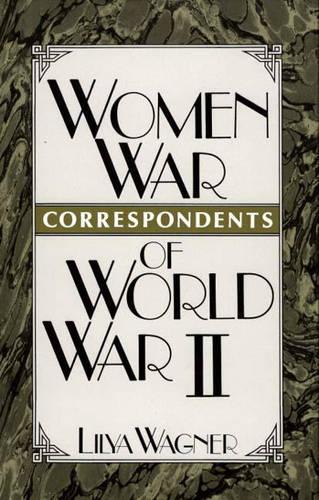
Women War Correspondents of World War II
(Hardback)
Publishing Details
Women War Correspondents of World War II
By (Author) Lilya Wagner
Bloomsbury Publishing PLC
Praeger Publishers Inc
25th October 1989
United States
Classifications
Tertiary Education
Non Fiction
General and world history
Second World War
Modern warfare
News media and journalism
940.5315042
Physical Properties
Hardback
187
Width 156mm, Height 235mm
510g
Description
During the World War II women correspondents wanted to be a part of the dramatic and exhilarating scene of wartime conflict as much as their male colleagues. The women who were interviewed were asked about their experiences, including conditions under which they reported, the types of stories they wrote and their accomplishments as journalists. Those studied were largely newspaper or wire service reporters who were at the front. A few others who wrote for magazines are included because of particularly interesting experiences or personalities. The obstacles that women correspondents faced are recounted here. For example, they found it difficult to get passports from the State Department and accreditation from the War Department. They faced antagonism from certain generals and sometimes bias and fear of competition from their male colleagues. On the other hand, many women discussed the help and support they received from men at the front. This book is an analysis of the woman correspondent. The problems of censorship, a war fought on different fronts and the dangers of then-modern warfare are recounted. Many women entered the field through newspaper jobs vacated by men who left for the front; they then worked their way into becoming war correspondents. For the most part they did not expect preferential treatment and avoided exceptional notice. According to their own accounts, they encountered problems unique to their sex, but were adept at handling the problems and were professional in their work. This book is a source of material on women who pushed beyond the sex role boundaries of their time to participate in a unique experience. Women's studies, journalism and courses on the history of World War II will benefit from this book.
Reviews
.,."To the reader old enough to be familiar with the bylines of these remarkable women, this book will bring back many memories. For the younger reader, female or male, these World War II experiences, not often found in current literature, will bring a new perspective on that tumultuous period. It would be an excellent addition to any course on women's studies."-Academic Library Book Review
...To the reader old enough to be familiar with the bylines of these remarkable women, this book will bring back many memories. For the younger reader, female or male, these World War II experiences, not often found in current literature, will bring a new perspective on that tumultuous period. It would be an excellent addition to any course on women's studies.-Academic Library Book Review
Based on interviews with female newspaper and wire service journalists who were at the front, Wagner discusses the obstacles that women correspondents face in covering the war as well as the help and support they received.-Jobem
"Based on interviews with female newspaper and wire service journalists who were at the front, Wagner discusses the obstacles that women correspondents face in covering the war as well as the help and support they received."-Jobem
..."To the reader old enough to be familiar with the bylines of these remarkable women, this book will bring back many memories. For the younger reader, female or male, these World War II experiences, not often found in current literature, will bring a new perspective on that tumultuous period. It would be an excellent addition to any course on women's studies."-Academic Library Book Review
Author Bio
LILYA WAGNER is Vice President for Institutional Advancement at Union College in Lincoln, Nebraska, where she also teaches courses in journalism and communications. She is the author of Peer Teaching (Greenwood Press, 1982).
